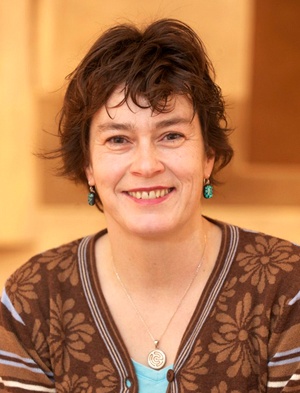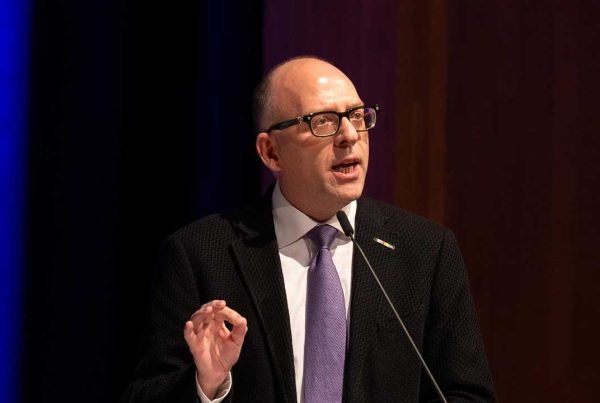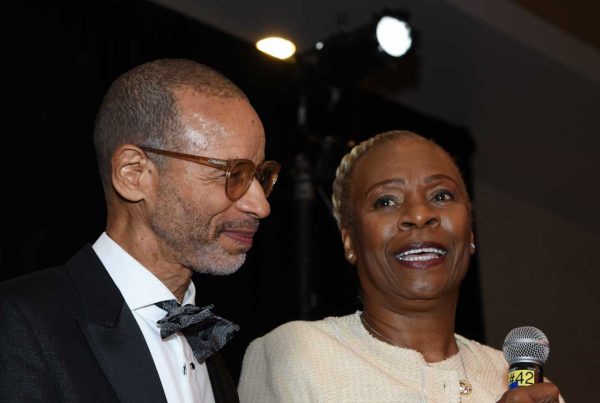 Dr. Helene Russell, Associate Professor of Theology at CTS and Director of both the Master of Theological Studies program and the innovative certificate program in Yoga and Spirituality, was recently interviewed by Dr. Tripp Fuller on the popular podcast, Homebrewed Christianity. The wide-ranging interview covered aspects of Prof. Russell’s personal and theological journey as well as a number of her research and teaching interests.
Dr. Helene Russell, Associate Professor of Theology at CTS and Director of both the Master of Theological Studies program and the innovative certificate program in Yoga and Spirituality, was recently interviewed by Dr. Tripp Fuller on the popular podcast, Homebrewed Christianity. The wide-ranging interview covered aspects of Prof. Russell’s personal and theological journey as well as a number of her research and teaching interests.
In the interview, she spoke of her own theological development and reflected on her time as a graduate student at Claremont School of Theology, where she encountered the thought of Alfred North Whitehead and process theology. Prof. Russell came to locate herself in the tradition of process theology and has written widely on the topic, including collaboration they discussed on the book Creating Women’s Theology: A Movement Engaging Process Thought.
Her PhD dissertation and much of her writing and teaching pertains to the 19th century Danish philosopher and theologian Søren Kierkegaard. Having fallen in love with Kierkegaard as a teenager from reading her mom’s old seminary books, Prof. Russell said that she finds Kierkegaard “so engaging in terms of asking questions and including questions of doubt… Even if I don’t agree with everything he says,” she noted, “the thing that’s important is the passion and the questions.”
Prof. Russell discussed her ongoing research at the intersection of trauma and theology, which has been an interest of hers since graduate school. She said, “In some ways I think my interest in the trauma work and my interest in Kierkegaard have a commonality: neither of them disregards the intellect,” but for both the intellect alone is “incomplete.” This aligns with her conviction that reason and cognition are critical parts of human life, but that “the depth of reality is about relationship and connection.” She explained, “the connection we have with each other is below the surface, it’s below our ability to simply talk about or make external cognitive connections.” She then discussed how a process-relational approach to theology can be especially helpful for addressing trauma, which is a critical aspect of her current work.
She also addressed the important connections between yoga—being a longtime practitioner and teacher herself—to trauma and theology. She explained, “There are a variety of different approaches that the trauma experts are working on that are non-verbal… Yoga can actually be really helpful, because yoga engages the breath [and the body].” Further, she said that yoga can be especially helpful in addressing trauma because there “there is a spiritual dimension to yoga – the connection with the breath, the connection with the deeper part of the self, and the movement itself.”
Listen to the full interview here.
We recently caught up with Prof. Russell to learn some more about her current teaching and research.
She is currently at work on a book about trauma and theology that builds on what she has learned from trainings with Dr. Bessel van der Kolk, psychiatrist and trauma expert, and David Emerson, innovator of trauma-sensitive yoga. The book will take the insights gained from her research and these trainings to develop what she described as “a theology and practice of Christianity that will be good news for persons suffering from trauma.” In the work, she plans to draw on process theology’s commitments to the ever-presence of God, the relationality and social responsibility of each person, and the embodiment of personal freedom. The new book will focus especially on embodiment, which, she explained, is “felt in the body through ritual actions and movement,” as well as the connections with and between persons “moving in synchronicity and praying in union” and “the resilience that is deep within each of us and within communities of healing transformation.”
Prof. Russell mentioned her ongoing excitement about directing the Master of Theological Studies (MTS) program, especially because, she said, “it attracts persons with passion and builds up clarity of thought while creating communities of Christian scholars. It brings out the best in us. I have witnessed students of various backgrounds engaging in honest and integrous scholarly debates and conversations that are sometimes difficult to have.”
She also spoke about the Yoga and Spirituality program at CTS. Integrating yoga, spiritual practices, and Christian theology, she said, “The program is about more than yoga; it is about transformed body/mind/souls.” Despite the recent difficulties brought about by the COVID-19 pandemic, she celebrated how it has continued to thrive. “I am just amazed at the power and effect of the program,” she said.
Learn more about the Master of Theological Studies (MTS) degree here.
Learn more about the certificate program in Yoga and Spirituality here.




